
Features
Hot topics
Incident reports
Lac-Megantic devastation
Lac-Megantic, Que. – Prime Minister Stephen Harper called it a war zone.
September 9, 2013
By Sean Farrell
Lac-Megantic, Que. – Prime Minister Stephen Harper called it a war zone.
That description of the Lac-Megantic train disaster was echoed by many, including the town’s fire chief, Denis Lauzon, who uttered those words in the aftermath of the horrific inferno that ravaged his picturesque Quebec village and claimed 47 lives in the early hours of Saturday morning, July 6.
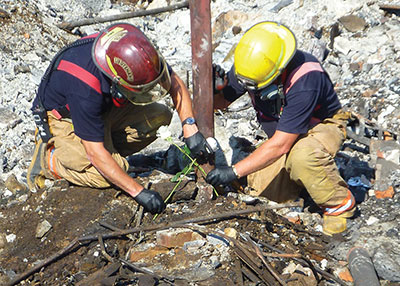 |
|
| Firefighters place roses at the site of the devastation in Lac-Megantic, Que. On July 6, a train carrying oil derailed and crashed into the town’s downtown core, causing an explosion that claimed 47 lives. Photos by gilles vekeman
|
Without warning, a runaway train of five locomotives and 72 oil tankers came screaming along the railroad tracks sloping down a hill leading to the crossroads at the heart of town, exploding in a conflagration that brought the eyes of the world to this tourism gem, located in southeastern Quebec.
Rolling at an estimated speed of 101 kilometres per hour, almost all of the black tankers derailed as the train banked through a curve. The unimaginable force of the train’s momentum piled the tankers into one another, over and over, stacking the black cylinders together as many ruptured and spilled their lethal cargo.
Extracted from North Dakota shale, the shockingly volatile crude oil erupted in a series of staggering explosions, never to make its way to the Irving refineries in New Brunswick.
Lauzon, who commands a volunteer force of about 40 firefighters, was coming out of a nearby house after answering a call about a fire.
“I saw a wall of flames in front of my eyes,” Lauzon told TC Media in the days immediately following the disastrous fire. “My first impression was a forest fire or an airplane crash. As I got closer I could see what it was.”
The train from hell had come to town.
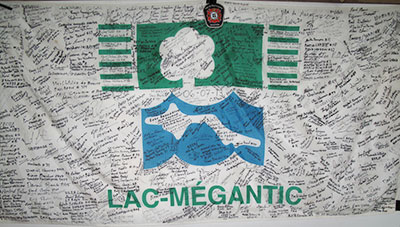 |
|
| A Lac-Megantic flag signed by all first responders who participated in the aftermath of the July 6 train derailment and explosion serves as a display of solidarity with the town and its firefighters.
|
In addition to the towering fireballs from the explosions, flaming oil went hurtling through a swath of downtown that slopes down to the shores of Lake Megantic. A river of lava entered the sewer system.
“We train but not for this type of intervention,” Lauzon said. “Sure, we saw the trains coming through town. We knew the potential for danger but we never could have imagined a disaster of this magnitude.”
Several people sleeping in their homes and apartments in the path of the destruction never had a chance. Neither did most of the revellers enjoying a typically festive weekend night at the Musi-Cafe, the town’s popular restaurant-bar featuring live music.
Some of those who were outdoors on the Musi-Cafe’s streetside terrace were among the lucky ones who escaped.
In all, nearly one per cent of the town’s population of 6,000 perished in the disaster.
The white-hot glow of the fireballs was so enormous that it showed prominently on a satellite image of Quebec shot on July 6 from space by NASA.
Gilles Vekeman, the division chief of training, strategy and tactics with the Gatineau Fire Service, was part of two teams that lent support from Ottawa’s sister city, 450 kilometres away in southwestern Quebec.
The Gatineau firefighters were called a week after the disaster to supplement and relieve the effort. Vekeman shared his experiences and observations in Lac-Megantic with Fire Fighting in Canada.
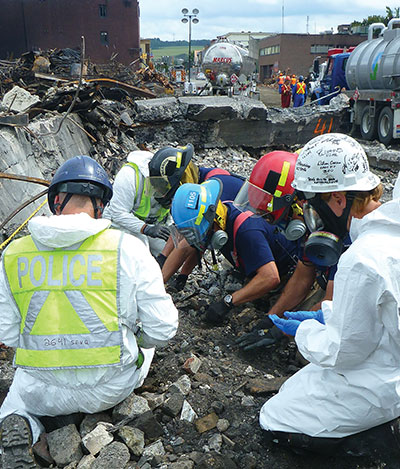
|
|
| Firefighters and other emergency responders sift through the wreckage looking for human remains after the fire and explosions in Lac-Megantic, Que., which destroyed 30 buildings in the town’s core.
|
“We had a lot of guys that wanted to go,” Vekeman said. “I’ve got 30 years of experience and I’ve never seen anything like it. It’s like a bomb exploded. The trees, they were blown away, burnt to a crisp. And it smelled everywhere, all kinds of smells. The rocks at the lakeside are like nothing else I’ve ever seen. The top of the rock was like charcoal. A gray powder on top and the rest of the rock exploded.”
The immediate challenge for the Lac-Megantic firefighters was getting to their equipment. Their downtown firehall was right on the edge of the fire zone.
“The courage and the determination of those firefighters is incredible,” Vekeman said. “I’ve got a lot of respect for all of them. They were very courageous. They made us proud for what they did and I did tell them that they really did a terrific job.”
Help was called in from Sherbrooke and Saint-Georges-de-Beauce, and several fire departments from the adjacent American state of Maine pitched in.
Franklin County dispatcher Stan Wheeler told Reuters that eight trucks carrying about 30 American firefighters were sent across the Canadian border.
Rangeley Fire Chief Tim Pellerin and his crew arrived with their pumper and ladder at six o’clock in the morning.
“We just pulled up and the whole downtown was burning,” Pellerin told a local NBC News affiliate. “It was just incredible. We had to stop for a minute and just realize the magnitude of what we were looking at.”
Pellerin and the other Maine chiefs put together a plan and went to work, pulling water from Lake Megantic, fighting to save a local hotel, and spraying the oil tankers.
“We went up there and it didn’t matter what your jacket said and what language it said it in, we fought the good fight to save the community,” Pellerin said. “I don’t know how many times during the 29 hours that we operated up there they came and thanked us and said, ‘We’re so happy to see trucks from America. We’re just so excited to see you guys come.’”
The tragedy had its roots some 11 kilometres up the railroad tracks in the nearby town of Nantes, where the local fire department was called at about 12:15 a.m. to put out an engine fire on one of the train’s five locomotives.
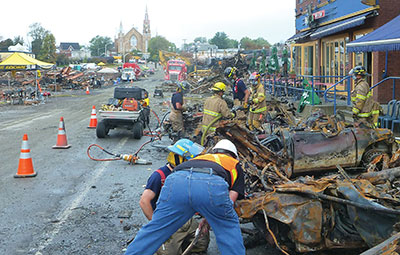 |
|
| Firefighters search for victims in the aftermath of the train derailment and explosion.
|
A crew of 12 Nantes firefighters extinguished the fire, which occurred in either the train’s fuel or its oil lines.
The train, operated by the Montreal, Maine & Atlantic Railway (MMA), was parked unattended on the railroad’s main line at the time of the fire. Two MMA representatives arrived on the scene as the fire was extinguished and cleared the firefighters to leave the scene.
Nantes Fire Chief Patrick Lambert told Reuters that it was a “good-sized” fire.
“We shut down the engine before fighting the fire,” Lambert said. “Our protocol calls for us to shut down an engine because it is the only way to stop the fuel from circulating into the fire.”
Investigations by the National Transportation Safety Board of Canada and Quebec provincial police will attempt to determine what ultimately caused the unmanned train to set itself in motion about an hour later, calamitously gaining momentum and speed as it descended the average 1.2 grade into the heart of Lac-Megantic. The CEO of MMA’s parent company, Rail World Inc., publicly acknowledged on July 12 that it was likely that not enough hand brakes had been applied to prevent the train from rolling.
The now-eerie drive between the two towns along provincial route 161 confirms the disastrous consequences of the region’s topography: it’s pretty much all downhill.
Jacques Proteau is the director general of the Quebec National Firefighters’ Academy and was a firefighter for 35 years. In giving his impressions of the firefighters’ work, Proteau repeatedly used the word “exceptional” during an interview with The Canadian Press.
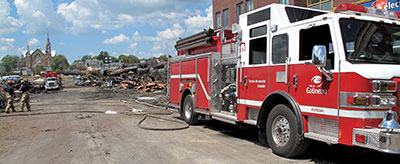 |
|
| Several fire departments provided aid to the small volunteer department in Lac-Megantic, including two groups from Gatineau, and one from Maine.
|
“We aren’t talking about taming a flaming barbecue,” said Proteau, who was not on site in Lac-Megantic, but followed developments closely. “We are talking about dealing with thousands and thousands of degrees that were actively triggering explosions.”
The only comparable disaster Proteau could recall was in 1979 in Mississauga, Ont., when a 106-car train filled with explosive and poisonous chemicals derailed and forced the evacuation of more than 200,000 people. Flames sprawled across 1.5 kilometres but, miraculously, no one was killed and only a few buildings were destroyed.
“This is the type of event that will only happen once in a career,” Proteau said. “This is unprecedented.”
Lessons learned from the Quebec disaster will be used in training future generations of firefighters.
“There are going to be conferences, post-mortems, detailed retrospective analyses, and we are going to draw conclusions about what happened in Lac-Megantic,” Proteau said. “Based on those conclusions, if our programs need to be adjusted or improved, I assure you, they will be.”
First responders had access to a crew of some 30 social workers and psychological counsellors brought in to work with and help the community’s citizens deal with the raw and powerful emotions that only the survivors of such a disaster could know.
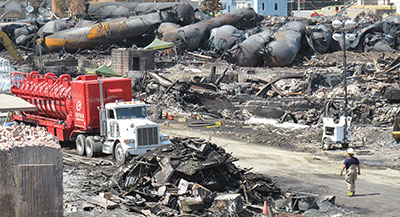 |
|
| The Montreal, Maine & Atlantic Railway train consisted of five locomotives and 72 oil tankers. When it derailed, the tankers caught fire, causing massive explosions that devastated the town.
|
A couple of moments will stay with Vekeman from his time in Lac-Megantic. Finding human remains of one of the youngest victims of the disaster was personalized when Vekeman subsequently saw a photo of the smiling child, who had been playing with an older sibling, whose life was also consumed by the fire.
“I had water in my eyes,” Vekeman said. “The next day we were that much more determined to search. That gets you motivated and that gives you an idea of the tragedy that the community of Lac-Megantic has endured.”
Vekeman admits that he was annoyed another time when he was working in the so-called red zone and two women were coming toward him with a police officer.
Incredulous at the sight of one of the women wearing sandals and shorts in the toxic soup of the disaster zone, Vekeman was told that the two were notaries who were anxious to get to a vault-like concrete structure that held various wills and testaments. The invaluable legal documents would be irreplaceable to many in the community.
“She said her grandfather had built it to withstand any kind of fire or explosion, and I said, ‘OK’, and we opened it,” Vekeman said. “All the paper was intact.”
Showered with thank-yous and gratitude, Vekeman said crews from St. Adele and Vaudreuil immediately pitched in as everyone helped remove the precious files.
“It’s unimaginable what it meant to them,” Vekeman said. “Just one will saved could mean so much.”
In all, the remains of 42 victims were located in the arduous and meticulous search. Efforts to find five more people missing and presumed to have died in the blaze were ultimately called off.
“It has branded us,” Lauzon said. “It’s a wound that will never disappear.”
A memorial mass was held three weeks after the disaster. Harper and Quebec Premier Pauline Marois were both greeted with ovations, but the loudest one was accorded to the firefighters.
Vekeman said that a Lac-Megantic firefighter’s comment marked his time in the community.
“He told me that the night of the fire they just felt very lonely, and then he said, ‘The next day we saw the brotherhood and we weren’t alone any more,’ “ said Vekeman. “That made me feel very proud to be a firefighter.”
Sean Farrell is a freelance writer based in Montreal who reports regularly for The Associated Press and was in Lac-Megantic immediately after the July 6 incident.
Print this page